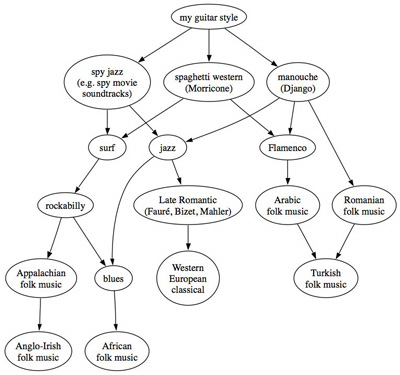Musical Influences
How it Started
I grew up, like most guitar players of my generation, on the canon of classic rock. My parents were fond of that music and I had heard it since the womb. In the early years of my guitar appenticeship, I learned every part — on every instrument — of every song on every Pink Floyd album between Meddle and The Wall, literally spending hours agonizing over which was the right fingering for the D major arpeggio at the opening of the first guitar solo in Comfortably Numb. I was also obsessed with Jimi Hendrix, learned a bunch of Cream songs, and every guitar part from the first four Led Zeppelin records.
If I had continued in that vein I would have had a prominent place in the retro-hippy rock movement of the early-to-mid-nineties, but time and over-familiarity led me to dislike most rock guitar playing, which sent me looking for something deeper.
Working backwards to the sources from which my heroes drew their influence and onward to the influences of their influences, and so on, learning Scotty Moore’s rockabilly licks, Robert Johnson’s slide technique, Skip James’s finger-picking, the jazz harmonies of T-Bone Walker, and finally worked forward to mid-century jazz artists running from Fletcher Henderson to Thelonius Monk, by way of Duke Ellington and George Gershwin. The latter of whom taught me about advanced chord theory, but none of whom gave me much direction concerning the guitar. Kenny Burrell’s smooth touch, Grant Green’s deep funk, Charlie Christian’s horn-esque lines, and, ultimately, Django Reinhardt’s gypsy virtuosity provided guitar examplars, but each of them had a unique style that was hard to integrate without veering into imitatation.
Film Soundtracks to the Rescue
Frank Barry, Henry Mancini and Ennio Morricone came to the rescue, synthesizing classical and jazz styles with surf guitar to create a new kind of music for film. These composers provided an example of what could be done with jazz guitar without morphing into easy listening music or bland funk. My more mature playing steals shamelessly from these composers, along with a sprinkling of left-over Django, to produce an eclectic style for which there is no demand.
These same influences have also had an impact on my compositions, including a loop that was commissioned as the theme music for a series of television commercials, but was rejected because it was “too spy.”
The roots of my playing are illustrated thusly:

The sort of thing that I play when no one is listening--what amounts to my personal style--can be heard here. It's a forty-five second improvisation that demonstrates my peculiar way of viewing an eight bar minor blues in E. Some things to note, for the musicologically interested, include:
The whole piece exhibits a moody rubatto.
The opening is a classic flamenco guitar motif, using a spread octave version of the first inversion of the Em chord.
When the tonality moves to the IV--Am--it’s done with a chord substitution to Cmaj7 (the VImaj7, which is also the relative major of the expected chord), using an E phrygian melodic bass figure, followed by the skeleton of a B7 chord that is, more or less, an inversion of an Em♯7 chord.
The traditional V-IV turnaround uses a B7♯5 (essentially a rootless Em♯7 chord with a B in the bass) moving down (using a figure in A harmonic minor) to an Am6 chord (one of Django’s favorite voicings) to which the 9th is added as a passing tone on the way down to the Em chord that, were I to continue, would start the cycle anew.
These harmonic and melodic decisions, though quite pleasing to me, aren’t very common. They're also not likely to become more so in the next wave of popular music.
The goal of most musicians is to find an individual voice. Some players have a voice that, like salt or pepper, is an agreeable seasoning for most musical dishes. Sadly, mine is more like paprika: something essential to very few concoctions that would likely ruin most.
My Doomed Compatriots
The only other young guitarists whom I know to share these influences, each to a differing degree, are Marc Ribot and Adrian Utley. Ribot is known to a larger audience primarily for his work with Tom Waits, though he has both a solo career and a fine nouveau Cuban-jazz band called Los Cubanos Postizos. Utley played guitar with the band Portishead and is presently working as a sideman (Sparklehorse, Marianne Faithful, etc) and composer.
⁂
This entry is part of my journal, published September 24, 2004, in New York.